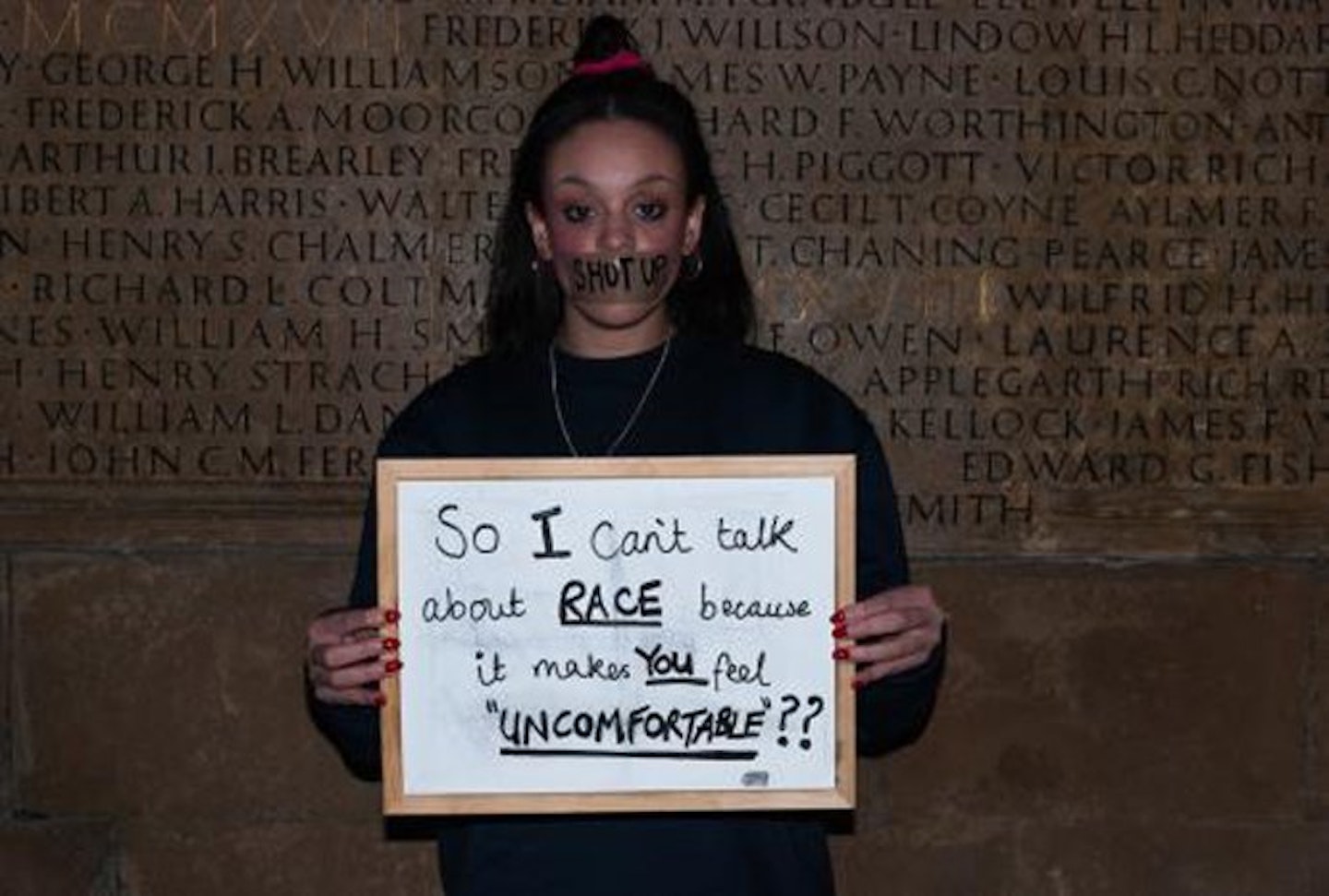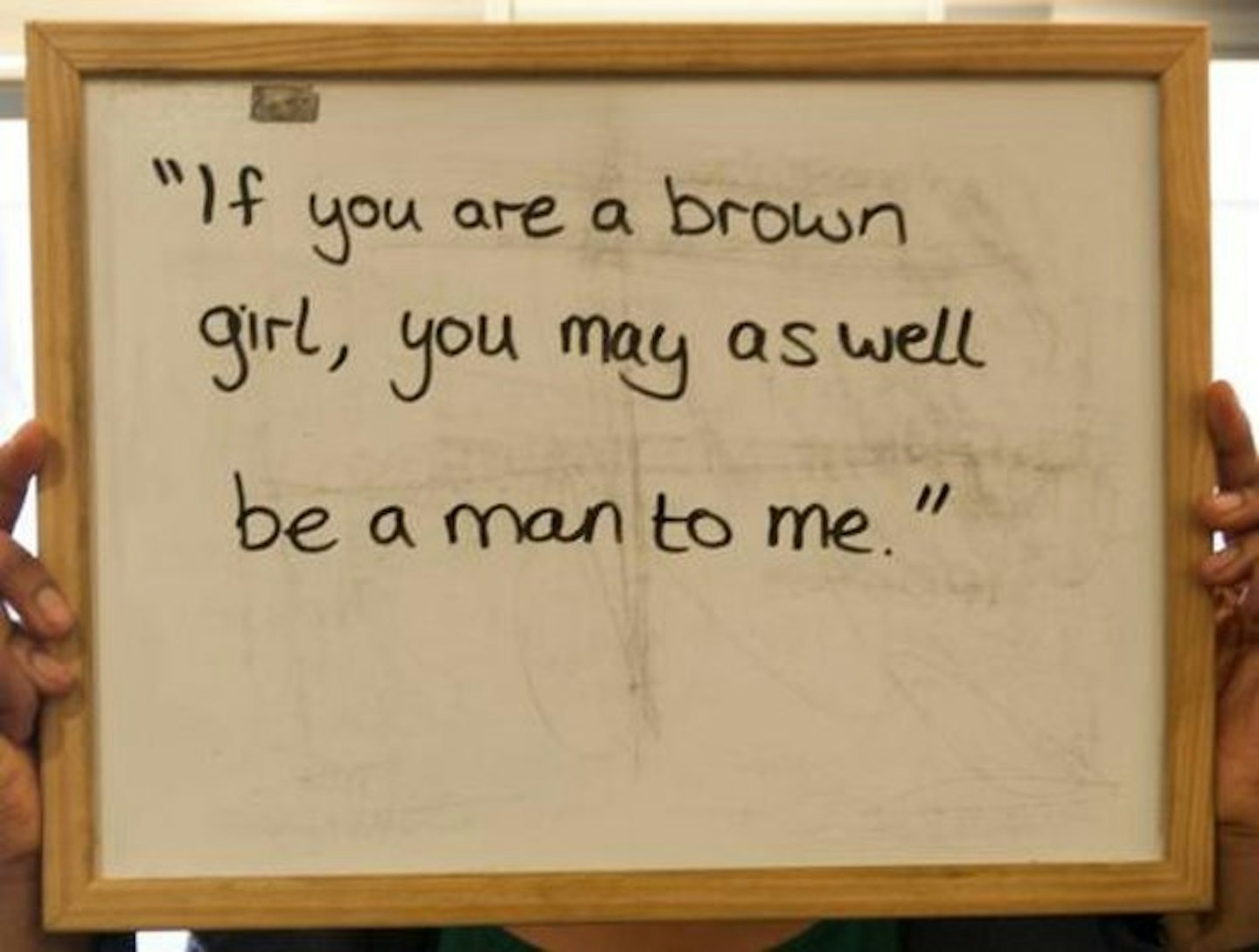‘So I can’t talk about my race because it makes you feel uncomfortable?’ reads one of the signs a Cambridge student is pictured holding. It’s bold stuff – and part of a campaign that’s designed to show that the reality of being a student at – what's long been thought of – one the universities of choice for the white, upper-class establishment.

The campaign was started by Yasmin Lawal, a 20 year-old third year Law student at Emmanuel College, Cambridge,who was so struck by the lack of diversity on campus that she launched the ‘I, Too, Am Cambridge’ campaign, which draws to a close today.
Last year, Oxford was accused of ‘institutional bias’ against black and minority ethnic students
The photography project features students who self-identify as ethnic minority students, or feel discriminated against due to their cultural identity or background within Cambridge University, holding up white boards with signs demonstrating how they've experienced racism or discrimination. The idea was to give students the opportunity to share their experiences on social media and has received an overwhelmingly positive response from students across the board.
‘We got the idea from the “I, Too, Am Harvard” campaign, in which a group of Harvard uni students spoke out against racial discrimination on campus using a photography project on Tumblr,’ Yasmin told The Debrief. ‘We were really inspired by the campaign, so all of us in Cambridge’s Black and Minority Ethnic Campaign wanted to follow suit. We wanted to give all those who self-identify as ethnic minority students, or those who feel discriminated against due to their cultural identity or background within Cambridge University, an opportunity to have their voices heard.’ A parallel ‘I, Too, Am Oxford’ campaign has also been launched.
Another girl was called ‘a typical Asian’ for studying medicine
Oxford and Cambridge Universities don’t have a great track record when it comes to inclusion of black and ethnic minority students. Last year Oxford faced accusations of ‘institutional bias’ after research said that white applicants are almost twice as likely to get a place on some of the university’s most competitive courses. (White applicants to medicine, for example, were twice as likely to get a place as minority ethnic candidates, even when they had the same triple A* grade A-level scores). And older figures from Cambridge University show a similar pattern.

Just looking at a snap shot of the pictures from the ‘I, Too’ campaigns from both universities can make for pretty grim reading. One student was told, ‘If you’re a brown girl, you might as well be a man to me,’ by one student, while another girl was called ‘a typical Asian’ for studying medicine. Another girl's sign reads, 'The first time I was called a “Paki” was in Cambridge.’ A lot hold up the stat that only 0.4% of UK professors are black.
But for many students, the lack of diversity is characterised by day-to-day irritations rather than overt racism. ‘I don’t think Cambridge Uni is institutionally racist,’ says Robyn Taylor, who spent last year studying history and looking for decent music venues at Kings College Cambridge. ‘But given how few students and lecturers are of an ethnic minority – as in any population where you’re part of a very small minority – it’s natural to feel isolated sometimes.’
Most of the local shops only stock ‘nude’ coloured tights designed for white skin
‘I know it seems trivial, but there’s only one tiny row of products for black hair at the local Boots and they’ve just got rid of the conditioner, so now there’s nothing I can use. Most of the local shops only stock ‘nude’ coloured tights designed for white skin, which would turn my legs a weird grey colour. For a long time there was no black hairdresser, so I used to have to trek it back home to my cousin’s house in Birmingham to get my hair done. There’s nowhere locally where I could buy any Caribbean food. Basically, it’s a pain – and not something a white girl would ever have to think about.’

Yasmin has been overwhelmed by the support both campaigns have received. ‘It has been great to see such widespread support from the University student body, as well as nationally,’ she explains. ‘We hope that we've inspired more students to talk more openly about black and minority ethnic issues. Too often, these voices unfortunately go unheard on campus. If anything, the “I, Too, Am Cambridge” project has really emphasised the diverse experiences of black and ethnic minority students in Cambridge. From what many students have said, racial discrimination more often than not stems from ignorance and a lack of awareness. We hope the campaign will inform and enlighten people, and encourage discussion of an issue which is not often productively discussed.’
So is there a solution? ‘There’s obviously room for improvement,’ says Robyn. ‘I personally think that the way to tackle this is to get more ethnic minority students to apply and for the uni to do everything it can to encourage and support this.’ The ‘I, Too, Am Cambridge’ campaign is incredible and important, but Robyn maintains that ‘the university also needs to reassure groups from ethnic minorities that studying at Cambridge can be incredibly rewarding. And show people that not everyone here is dead posh.’
Follow Sophie on Twitter @sophiecullinane
This article originally appeared on The Debrief.
_349x620.jpg?ar=16%3A9&fit=crop&crop=top&auto=format&w=1440&q=80)